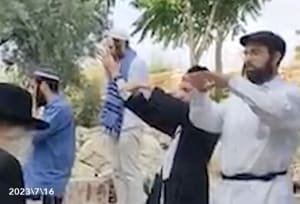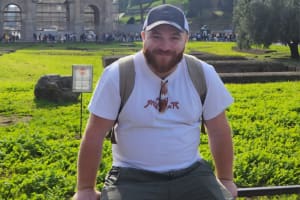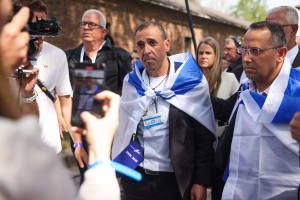Sacred words with an ancient lineage – over 30,000 join priestly blessing at Western Wall

In the Torah, right after describing the ascetic life of those who take Nazarite vows in Numbers 6, the Lord tells Moses, “Speak to Aaron and his sons, saying, ‘This is the way you shall bless the children of Israel. Say to them…” Then follows what has famously become known as “the priestly blessing”, or in Hebrew, “Birkat haCohanim”. It goes like this:
“The Lord bless you and keep you; The Lord make His face shine upon you, And be gracious to you; The Lord lift up His countenance upon you, And give you peace” (Numbers 6:24–26).
It’s a beautiful, heartwarming impartation of blessing, but some of the concepts might seem a little strange to modern, western ears. How does it help, for example, if God’s face is shining on us? What does it mean for Him to lift up His countenance? The more we understand about these terms and how it was understood in biblical times, the more powerful the blessing becomes.
But first let’s look at the priests themselves. Originally God wanted the firstborn of every family to be set aside to serve Him (Exodus 13:1), but after the tribe of Levi came out defending the Lord’s honor so zealously in the wake of the golden calf incident in Exodus 32, God decided to make a change.
He explains it thoroughly in Numbers 8, a couple of chapters after the priestly blessing. In short, He says, “I have taken the Levites instead of all the firstborn of the children of Israel” (v18) and from then on, that was that. Moses and Aaron were Levites, and the entire tribe were called into the service of the Lord.
The priests of God, or “cohanim” in Hebrew, were to serve in the temple. All cohanim were from the tribe of Levi, but not all Levites were priests.
The priests of God had a very important role helping the people of Israel worship God, and there was a lot of work involved in maintaining the sacrifices and the proper upkeep of the tabernacle, and later the temple. You have probably come across people with the family name “Cohen” today, and the link – indeed the gene – still continues down the priestly line of cohanim (plural of cohan) to this day.
Dr. Skorecki, a nephrologist and a top-level researcher at the University of Toronto and the Rambam-Technion Medical Center in Haifa has been involved in breakthroughs in molecular genetics. With his interest in the application of DNA analysis to the study of history and population diversity, he considered the hypothesis that there could be a set of genetic markers that derive from a common ancestor: Aaron the first cohen.
Skorecki wondered whether Aaron’s line could have been maintained since Sinai, and more importantly, if such a claim could be tested. Together with leading researcher in molecular genetics and a pioneer in Y chromosome research, Professor Michael Hammer, he set to work. Their first study was reported in the British science journal, Nature (Jan. 2, 1997).
After analyzing the DNA of 188 Jewish males they found the Y chromosome markers of the Cohanim and non-Cohanim were indeed significant. One genetic marker in particular, (YAP-) was detected in 98.5 percent of the Cohanim. In another study they found that six chromosomal markers were found in 97 of the 106 Cohens tested, which are known as the Cohen Modal Hapoltype (CMH) – the standard genetic signature of the Jewish priestly family.
The Bible states several times over (see Exodus 29:9, 40:15, Numbers 25:13) that the priesthood would continue forever, and it seems that even though many entire tribes have been lost in history, the priestly line can still be verifiably identified today.
In ancient times the cohanim would impart the priestly blessing every day, as it is even today in Jerusalem. The blessing is given at every synagogue service and also as part of the feasts when it’s possible to see tens of thousands stream to the Western Wall to receive the blessing.
Sometimes referred to as “Nesi’at Kapayim” or the raising of hands, the priests shape their fingers to make the letter shin (ש) just as Spock did in Star Trek (Leonard Nimroy was Jewish, and saw it in the synagogue). The letter Shin represents “Adonai”, the name of the Lord. You’ll notice the name of the Lord appears three times over, as it does in the Shema: “Hear O Israel, the Lord your God, the Lord is One, worship the Lord…” So we see His name appearing three times, suggesting the trifold nature of the godhead.
Unusually, the blessing is given directly and spoken in the second person, rather than first person plural (“you” rather than “us”) adding to the impact of the words to the hearer. It has become tradition not to look at the one giving the blessing, or at anything in particular, but just to concentrate on receiving the blessing. The words are full of such profound kindness that the priestly blessing has been called a “divine hug!"
“The Lord bless you and keep you” speaks of God's great kindness, provision, and protection. The next words make sense in the context of relating to royalty in the ancient world: “the Lord make His face shine upon you and be gracious to you” is reminiscent of Proverbs 16:15, which says, “In the light of the king’s face is life, and his favor is like a cloud of the latter rain.”
Kings in biblical times held the power of life or death for their subjects, and finding favor in their sight was seen as a great blessing, like much needed rain. “Light” in the face of the king indicated favor from one who had power to determine destinies.
The next phrase, “The Lord lift up His countenance upon you”, can be better understood once again when we compare it to other biblical expressions. In Genesis 4, we see in the story of Cain and Abel that a “fallen countenance” indicated a significantly negative state. “So the Lord said to Cain, “Why are you angry? And why has your countenance fallen?” When we consider the opposite, a lifted countenance speaks of God’s profound positivity and disposition towards His people.
Lastly the expression, “And give you peace” carries great weight of covenantal proportions. Taking an example once again from the opposite in the Scriptures, we can grasp more of the meaning when we consider the corollary. Jeremiah the prophet was told not to waste time crying for the people of his time:
“Do not enter the house of mourning, nor go to lament or bemoan them; for I have taken away My peace from this people,” says the Lord, “lovingkindness and mercies…” (Jeremiah 16:5). Here we see God taking away His peace, His friendship from the people, but the priestly blessing invokes the opposite. Instead of removing peace He is imparting it. God’s lovingkindness and mercies are part of the package. The passage in Numbers 6 ends with God instructing, “So they shall put My name on the children of Israel, and I will bless them.” What a powerful promise.
The priestly blessing took on global significance during the Covid pandemic when it was put to song and went viral. Many different versions were made in different languages, including one from the Middle East, singing out words of peace and blessing in languages from across the region in this time where it is sorely needed.

Jo Elizabeth has a great interest in politics and cultural developments, studying Social Policy for her first degree and gaining a Masters in Jewish Philosophy from Haifa University, but she loves to write about the Bible and its primary subject, the God of Israel. As a writer, Jo spends her time between the UK and Jerusalem, Israel.
You might also like to read this:

















